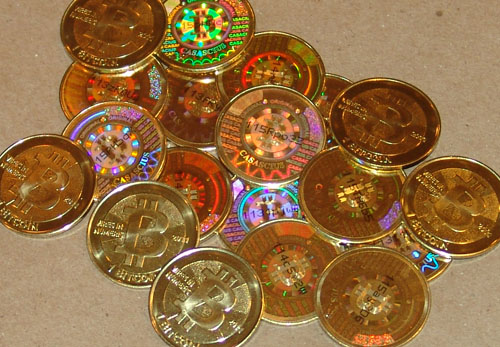 |
| Casascius Bitcoins |
Meanwhile, the Bitcoin price has been slowly drifting downwards; it's now around $5-6. I think the overall level of enthusiasm for Bitcoin is waning. I am getting the feeling now that the negative press exposure, along with some real security and usability issues will keep Bitcoin from hitting the mainstream for a while. It needs to become much easier to use securely, so that many more merchants (and consumers) will accept it.
Fortunately, some good progress is being made in this area, with a couple of convenient new forms for direct hand-to-hand physical exchange of Bitcoins becoming available (in addition to the Bitbills which I mentioned in my previous post):
- Casascius Bitcoins (above) which are real metal (brass) coins, with the Bitcoin's private key data hidden under a tamper-resistant peel-off hologram. These appear professionally made; of course, as with any third-party service for generating wallet data, a certain level of trust is required, that the producer didn't keep a copy of the wallet data for themselves. But they look cool, and I'll probably order one at some point, for the "gee whiz" factor at least, and to show it off. This is the first physical Bitcoin that actually looks like we'd imagine a Bitcoin would look!
- Global Standard Bank has initiated a promotional distribution of its new BitCards. I received one in the mail today (pic at right)! These cards do not store the wallet data directly, but rather a security code (hidden under a scratch-off strip) which will allow you to retrieve the actual BitCoins via an online transaction with GSB. If the scratch-off area is intact, then the value is still there. (And another online process can be used to positively verify the validity of the card without invalidating it.) Therefore, these cards function more like a bank note or transferrable gold certificate than like a physical coin - they are not actual base money, but rather represent a Bitcoin that is stored by the bank somewhere, and that can be retrieved from the bank on demand. However, unlike a simple bank note, the BitCard also has an anti-theft security feature, which is a secret passcode (known only to GSB and to the original receiver of the card, and whoever they give it to) which must be provided (along with the scratch-off code) in order to redeem the card. Thus, a stolen BitCard is useless unless you manage to obtain its passcode as well. In a way, you could think of it being like a transferable debit card that requires a PIN to access it, and where all the money in the account must be debited in a single transaction.
 |
| Global Standard Bank's One-Bitcoin BitCard |
Personally, I'm still trying to decide whether to cash in my BitCard now, and transfer the 1 BTC of value to my private, multiply backed-up encrypted wallet, or to just hold onto the card in case of emergency. No hurry to decide, though... So, I'll probably just hold onto it for the time being. You never know when a Bitcoin in your pocket might come in handy, say if some unexpectedly rapid global financial meltdown causes the value of all non-cryptocurrencies to collapse, and you're trying to buy gas in the middle of nowhere from a merchant who is convinced that Federal Reserve Notes are worthless. (After all, Greece keeps edging closer and closer to the brink of default, the stock market seems chronically jittery, and you never know when the Fed might decide to crank up the presses and start a big new QE3 or something.)
No comments:
Post a Comment